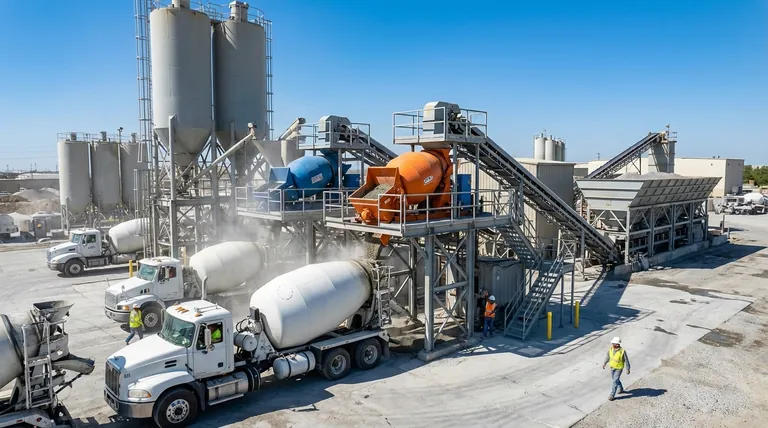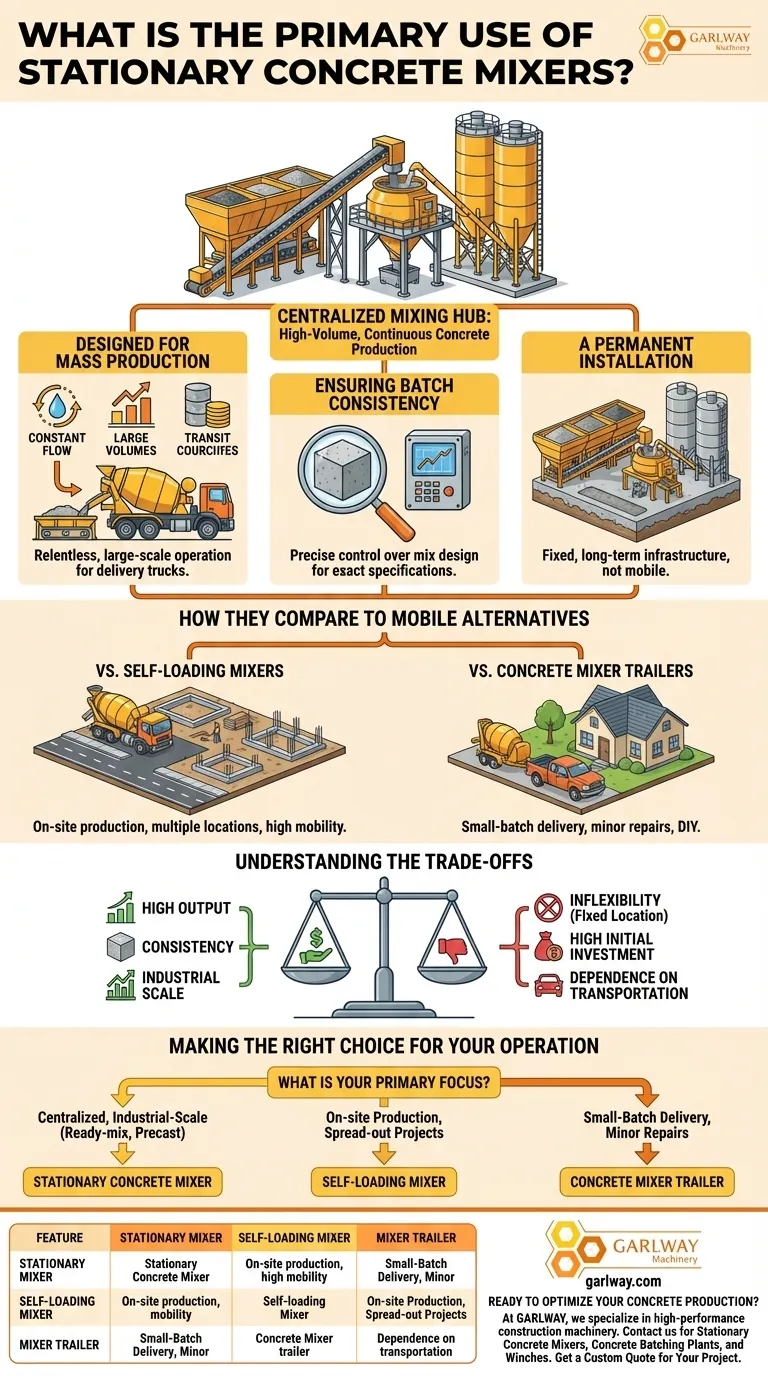The primary use of a stationary concrete mixer is for high-volume, continuous concrete production in a single, fixed location. These machines are the heart of operations that require a consistent and massive supply of concrete, such as ready-mix concrete plants, precast factories, and major construction sites for projects like dams or large buildings.
The decision to use a stationary mixer over a mobile alternative is not about the basic task of mixing concrete, but about the fundamental logistics of your operation. Stationary mixers are built for centralized, industrial-scale production where output and consistency are the highest priorities.

The Role of a Centralized Mixing Hub
A stationary mixer isn't just a machine; it's the core component of a larger concrete production plant. Its design and purpose are entirely focused on serving as a permanent, high-output hub.
Designed for Mass Production
Unlike portable mixers, stationary units are engineered for relentless, large-scale operation. They are built to continuously produce concrete that is then loaded into transit-mixer trucks for delivery.
Ensuring Batch Consistency
By operating in a controlled, permanent environment, stationary mixers allow for precise control over the mix design. This ensures that every batch of concrete meets the exact same specifications, which is critical for large-scale structural integrity.
A Permanent Installation
The term "stationary" is literal. These mixers are permanently installed and integrated with other plant equipment like aggregate bins, cement silos, and conveyor systems. They are a long-term infrastructure investment, not a piece of mobile site equipment.
How Stationary Mixers Compare to Mobile Alternatives
Understanding the function of a stationary mixer becomes clearer when you compare it to its mobile counterparts. Each type is a specialized tool designed for a different operational scale and need.
vs. Self-Loading Mixers
Self-loading mixers are versatile machines that bring the concrete plant to the job site. They are ideal for projects that require concrete at multiple locations across a large area, such as road paving or building multiple foundations on a single development.
vs. Concrete Mixer Trailers
At the opposite end of the spectrum are concrete mixer trailers. These are small-capacity units, often towed by a pickup truck, designed for supplying short loads of concrete for minor repairs, residential projects, or DIY jobs.
Understanding the Trade-offs
Choosing a stationary mixer involves committing to a specific operational model with clear benefits and significant limitations.
The Cost of Inflexibility
The most significant trade-off is the complete lack of mobility. A stationary mixer serves one location only. The concrete it produces must be transported, which introduces logistical challenges like travel time and traffic that can impact the concrete's viability.
High Initial Investment
These mixers represent a substantial capital investment. The cost includes not only the machine itself but also the extensive supporting infrastructure required to create a fully functional concrete plant.
Dependence on Transportation
An operation built around a stationary mixer is entirely dependent on an efficient fleet of transit-mixer trucks. Any disruption to transportation can halt the entire workflow, from the plant to the pour site.
Making the Right Choice for Your Operation
Selecting the correct type of concrete mixer is about matching the equipment's core design to the scale and logistical demands of your work.
- If your primary focus is centralized, industrial-scale production for a ready-mix plant or precast factory: The stationary concrete mixer is the unambiguous standard for its high output and consistency.
- If your primary focus is on-site production for large but geographically spread-out projects: A self-loading mixer offers the essential mobility and flexibility that a stationary plant cannot.
- If your primary focus is small-batch delivery for residential work or minor repairs: A concrete mixer trailer provides the most cost-effective and practical solution for short-load needs.
Ultimately, aligning the equipment's core strength—be it centralized production or mobile flexibility—with the specific demands of your project is the key to an efficient operation.
Summary Table:
| Feature | Stationary Mixer | Self-Loading Mixer | Mixer Trailer |
|---|---|---|---|
| Primary Use | Centralized, high-volume production | On-site production for multiple locations | Small-batch delivery for minor jobs |
| Mobility | Fixed installation | Highly mobile | Towed by vehicle |
| Ideal For | Ready-mix plants, precast factories, large projects | Road paving, large developments | Residential, DIY, repairs |
| Output Scale | Industrial, continuous | Medium to large | Small |
Ready to optimize your concrete production?
At GARLWAY, we specialize in high-performance construction machinery, including stationary concrete mixers designed for reliability and massive output. If your operation requires centralized, industrial-scale concrete production for a ready-mix plant, precast factory, or major construction project, our solutions deliver the consistency and durability you need.
We serve construction companies and contractors globally with:
- Stationary Concrete Mixers for high-volume, fixed-location production.
- Concrete Batching Plants for complete, integrated mixing systems.
- Winches for heavy-duty lifting and positioning on site.
Contact us today to discuss how our equipment can enhance your project's efficiency and output. Let's build something great together.
Get a Custom Quote for Your Project
Visual Guide

Related Products
- Hydraulic Concrete Mixer Machine Cement Mixing Equipment for Mixture Concrete
- Construction Products Concrete Plant Machine Mixing Concrete Mixer
- HZS25 Best Cement Mixer for Quick Mix Concrete at Bunnings
- Portable Concrete Mixer Machine Equipment for Mixing Concrete
- HZS75 Concrete Batching Plant Cement Mixer Price Concrete Mixer Bunnings Mixing Plant
People Also Ask
- What are the structural types of forced mixers? Choose the Right Mixer for Your Concrete Plant
- What are the differences between volumetric mixers and traditional drum mixers? Maximize Efficiency & Control On-Site
- How do cement mixers enhance safety on construction sites? Reduce Strain, Hazards, and Accidents
- What are the main types of drum mixers and their applications? Choose the Right Mixer for Your Project
- What is a pan-type concrete mixer and what are its characteristics? Get Superior Mix Quality & Versatility
- Why are cement trucks always spinning? To Prevent Concrete From Hardening Prematurely
- What is the capacity range of mixer drums? Optimize Your Concrete Delivery from 8 to 12 m³
- What types of mixtures are concrete mixers best suited for? Maximize Your Construction Efficiency



















